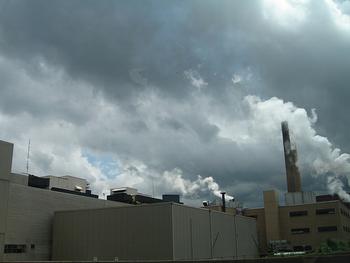Court Overturns Bush-Era Air Pollution Waivers
WASHINGTON, DC, July 15, 2009 (ENS) - A federal appeals court has invalidated Bush administration rules that allowed power plants and factories to emit uncontrolled air pollution in cities where the air is already polluted.
The U.S. Court of Appeals for the D.C. Circuit found the U.S. Environmental Protection Agency rules illegally allowed power plants to buy rights to pollute, sometimes from plants hundreds of miles away, instead of installing modern emission controls, technically called reasonably available control technology.
In its July 10 ruling, the court also invalidated parts of the rule that weakened pollution limits for major new or expanded factories and power plants in cities with unhealthful air.
"Rejecting these waivers is a breath of fresh air to millions of Americans living in cities that violate clean air standards," said David Baron, Earthjustice attorney. "The EPA rule let power plants pump uncontrolled air pollution into regions that already had dangerous smog levels. We said that violated the law, and the court agreed."
 |
Air pollution in Pittsburgh (Photo by Sara Power) |
Earthjustice filed the suit, representing the Natural Resources Defense Council. The states of New Jersey, New York and Connecticut also joined in part of the challenge.
Power plants are a leading source of the pollutants that make up smog. Smog is linked to premature deaths, thousands of emergency room visits, and tens of thousands of asthma attacks each year.
Smog is especially dangerous to small children and senior citizens, who are often warned to stay indoors on polluted days.
Power plants also are major sources of soot and other particles linked to tens of thousands of premature deaths every year.
"This decision will mean cleaner air and stronger air quality protections across the country," said John Walke, clean air director for the Natural Resources Defense Council. "With summer smog blanketing our communities, this decision is a welcome relief and promise of stronger health safeguards.
"We ask EPA Administrator Lisa Jackson to take this opportunity to protect all Americans swiftly against dangerous smog pollution," said Walke.
The case arose from an air pollution trading program aimed at reducing pollution that travels between states.
The EPA rule overturned by the court created loopholes by allowing power plants in already polluted communities to avoid installing controls by buying pollution credits from another plant that could be hundreds of miles away. Earthjustice argued that the waiver violated the Clean Air Act.
Twenty-two states are members of this interstate program, and most of them contain areas where the air is already polluted, officially known as "non-attainment areas," including cities like Chicago, Pittsburgh, Baltimore, New York and Philadelphia.
Environmental advocates and affected states are not the only ones who took issue with the power plant exemption.
The National Petrochemicals and Refiners Association filed a brief also objecting to this waiver.
The court also rejected weakening Clean Air Act limits on new and expanded factories in polluted communities. The law requires new plants to more than offset their increased emissions, for example by arranging for greater pollution reductions from other facilities in the area.
Yet the Bush rules let new plants claim offset credit for historical pollution reductions from plants that closed down decades ago. The rules allowed such credits even in cities that lacked programs to assure that they would still meet health standards on time if the old credits were used.
The court held that the offset credits could not be allowed in cities that lacked approved plans assuring that they would meet clean air standards on time.
Copyright Environment News Service (ENS) 2009. All rights reserved.
To subscribe or visit go to: http://www.ens-newswire.com